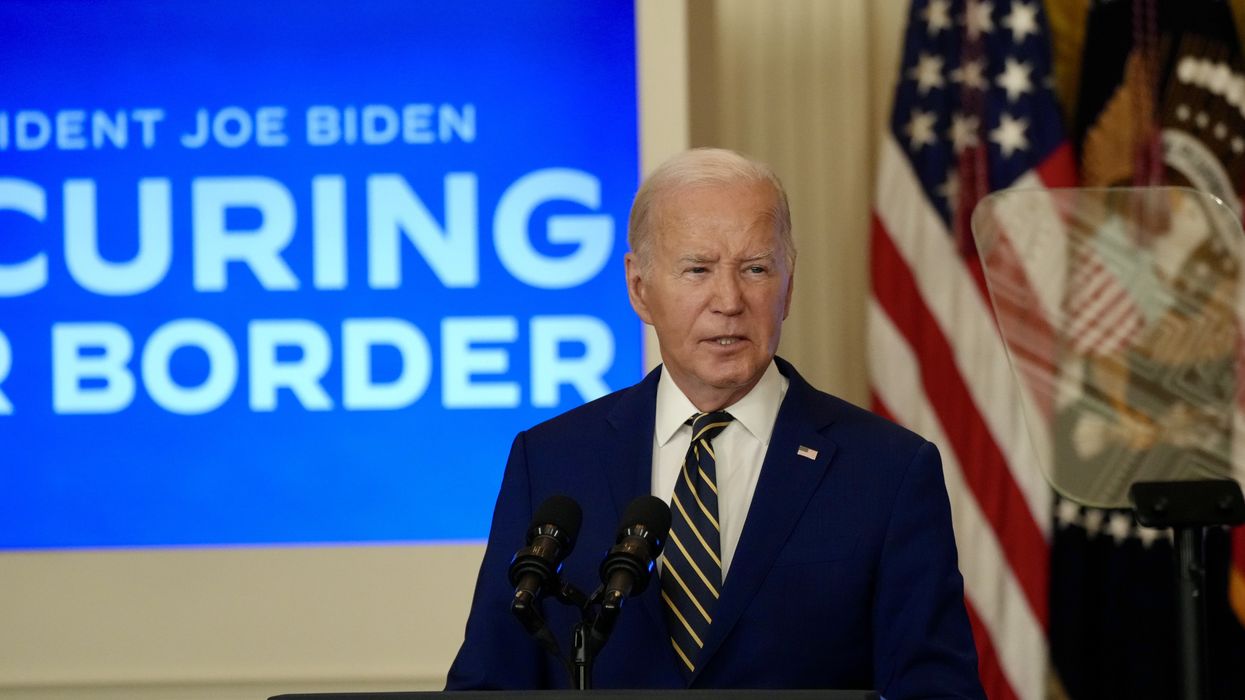Breslin is the Joseph C. Palamountain Jr. Chair of Political Science at Skidmore College and author of “A Constitution for the Living: Imagining How Five Generations of Americans Would Rewrite the Nation’s Fundamental Law.”
This is the latest in “ A Republic, if we can keep it,” a series to assist American citizens on the bumpy road ahead this election year. By highlighting components, principles and stories of the Constitution, Breslin hopes to remind us that the American political experiment remains, in the words of Alexander Hamilton, the “most interesting in the world.”
The Democrats are underwater. Alarmingly so. That’s good news for Joe Biden.
A recent Gallup poll revealed that there are fewer Democrats and Democrat-leaning independents than at almost any time since Gallup began seriously studying party affiliation in 1992. Democrats are currently underwater by 7 percentage points, in terms of partisan advantage (“the percentage of U.S. adults identifying as or leaning Democratic minus the percentage identifying as or leaning Republican”). Only once before — in December 1992 — did Democrats face a similar shortfall. Since then, the party on the left has almost always been in the black, even reaching a partisan advantage of a whopping 18 percent in 2008.
Doubtless those figures have the Biden campaign worried. The deficit has prompted some urgency. In recent weeks, the president has stepped up his attacks on former President Donald Trump, altered his immigration stance, touted his economic success, and even put money directly back into the pockets of his most skeptical audience. Democratic members of Congress have similarly celebrated the considerable successes of this administration. So has the Democratic National Committee. And yet the needle has barely moved. The last time the Democratic Party was consistently above water was the summer of 2021. Since then, the party of the left has been furiously swimming upstream, trying to gain traction with a largely disaffected electorate.
So, what happened? What accounts for the significant decline in Democratic Party support in recent years? Well, the first thing one notices when reviewing the fine-grained data is the fairly significant increase in independent voters over the past two decades. The percentage of independent voters used to hover around 30 percent; they constitute almost half of the electorate now. That increase in non-affiliated voters has assuredly impacted the Democratic rolls.
Of course, it’s also impacted Republican numbers. Thirty-eight percent of the electorate were registered Republicans in November 2004. Today, that number is 27 percent. It seems that the independent electoral movement is siphoning converts from both sides of the aisle.
Perhaps it’s the incumbency problem at the top. Sitting presidents are frequently the source of partisan ire and admiration. Perhaps we can infer something about the Democrats’ deficit from presidential popularity over the decades. The answer is maybe. Biden’s job approval rating is low, averaging around 40 percent for the past many months. That’s bad news for the incumbent. But those numbers are within the margin of error for several former presidents, including Trump and, until right before the 2012 election when he saw a considerable spike, Barack Obama. One incumbent president was reelected with less than stellar approval ratings (Obama), and one was not (Trump). Throughout this period, though, Democrats were still doing well — they were above water.
We might also surmise that Democrats face unprecedented headwinds, challenges no party or president has likewise encountered in the 21st century. Covid-19 wreaked havoc on public perception ( the economy is not as bad as many suggest); there is battle fatigue over the country’s support for overseas wars; both the Supreme Court and Congress appear feckless; polarization is testing our capacity for patience and compassion; traditional allies, like young voters, union members,and persons of color, are abandoning the party in record numbers; the party’s standard bearer is just plain old. I could go on. The list is long, the troubles are real and the Democrats are reeling.
So then why is this good news for President Biden? Why should Democrats feel some optimism about the current electoral landscape?
Because he’s keeping it close. The most recent polls show that Biden is running neck and neck, nationally, with Trump. The current president is even remaining competitive in some of the crucial swing states. Staying competitive in a race where both candidates are facing eye-popping disapproval ratings may seem like a hollow victory. But in this political climate — where the Republican base is more energized, incumbency is a liability, Democratic Party registration has slowed, Covid’s electoral relevance is long gone, inflation remains high and traditional Democratic backers are questioning their allegiance — any victory is welcome. The contrast is rich. The Democratic Party is bleeding support while polls suggest that its leader remains electorally viable.
Of course, the presidential race is barely across the starting line. Nov. 5 is a long way off and a lot can happen between now and then. If I’m Julie Chavez Rodriguez, Biden’s talented campaign manager, I’m focused as much on getting the Democratic Party above water as I am on the administration’s record, or the candidate’s experience, or even the virtue of continuity. What is more, a push to close the partisan gap in the months leading up to Election Day has the benefit of dimming the spotlight just a bit on an incumbent president who appears reluctant to spar with the press. Counter the president’s electoral vulnerabilities, I say, with a multifront campaign centered on his successes, Trump’s unpredictability and shoring up the Democratic Party rolls.
In the end, it seems apparent that closing the 7 percent deficit Democrats face today may be the key to holding on to the White House, surging in the Senate and flipping control of the House. Democrats, it appears, will need to learn how to tread water once again.




















Trump & Hegseth gave Mark Kelly a huge 2028 gift